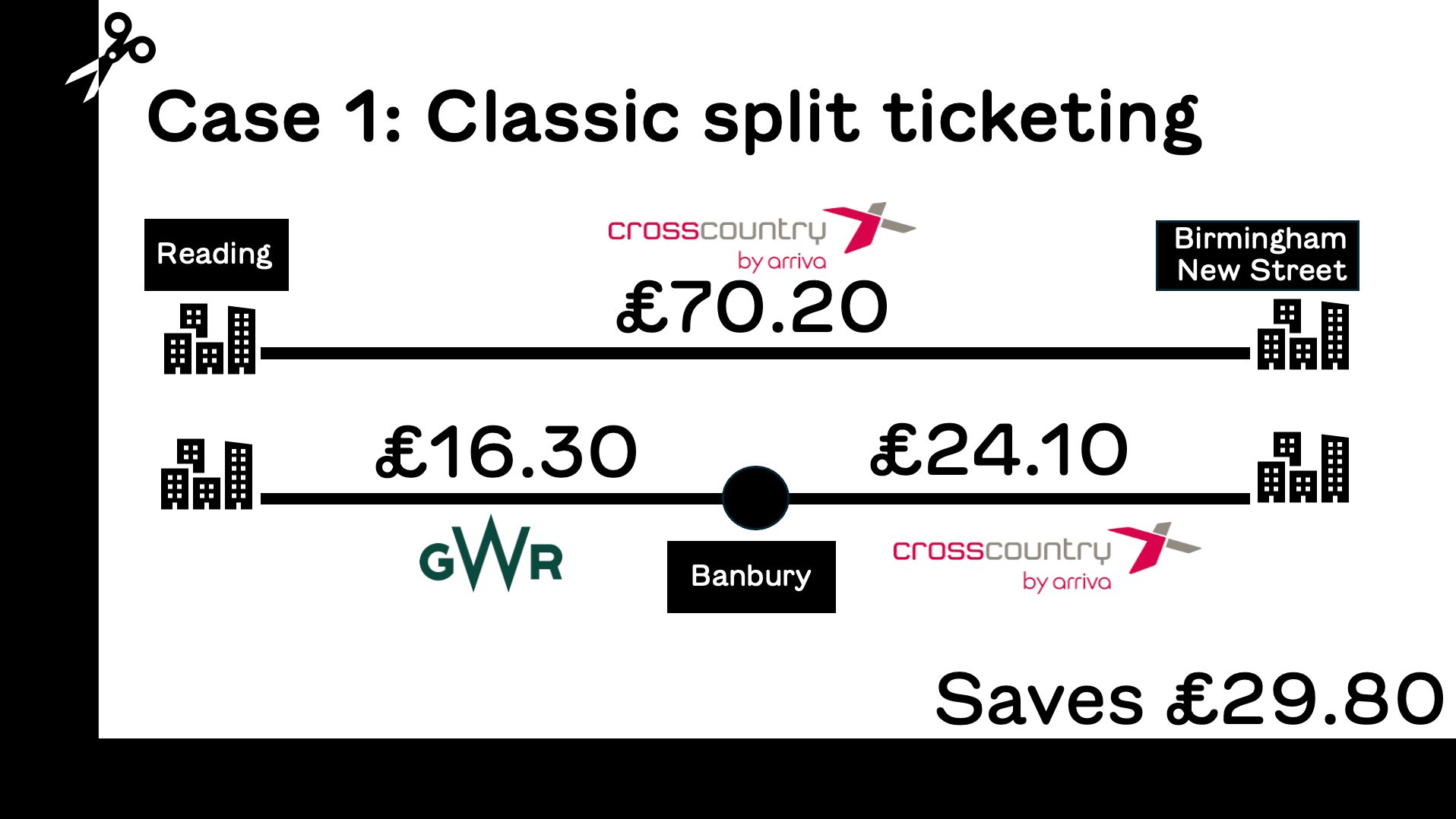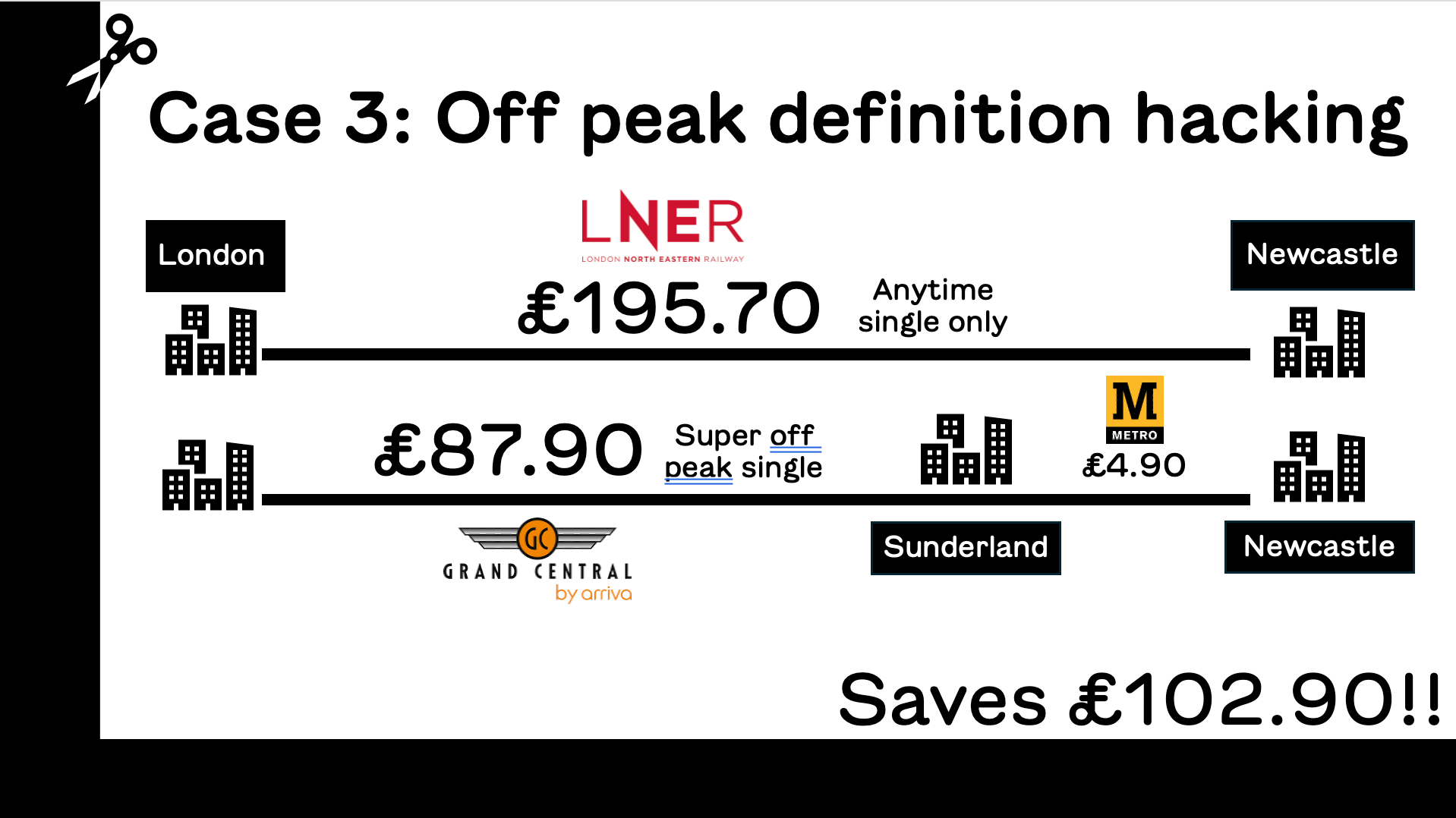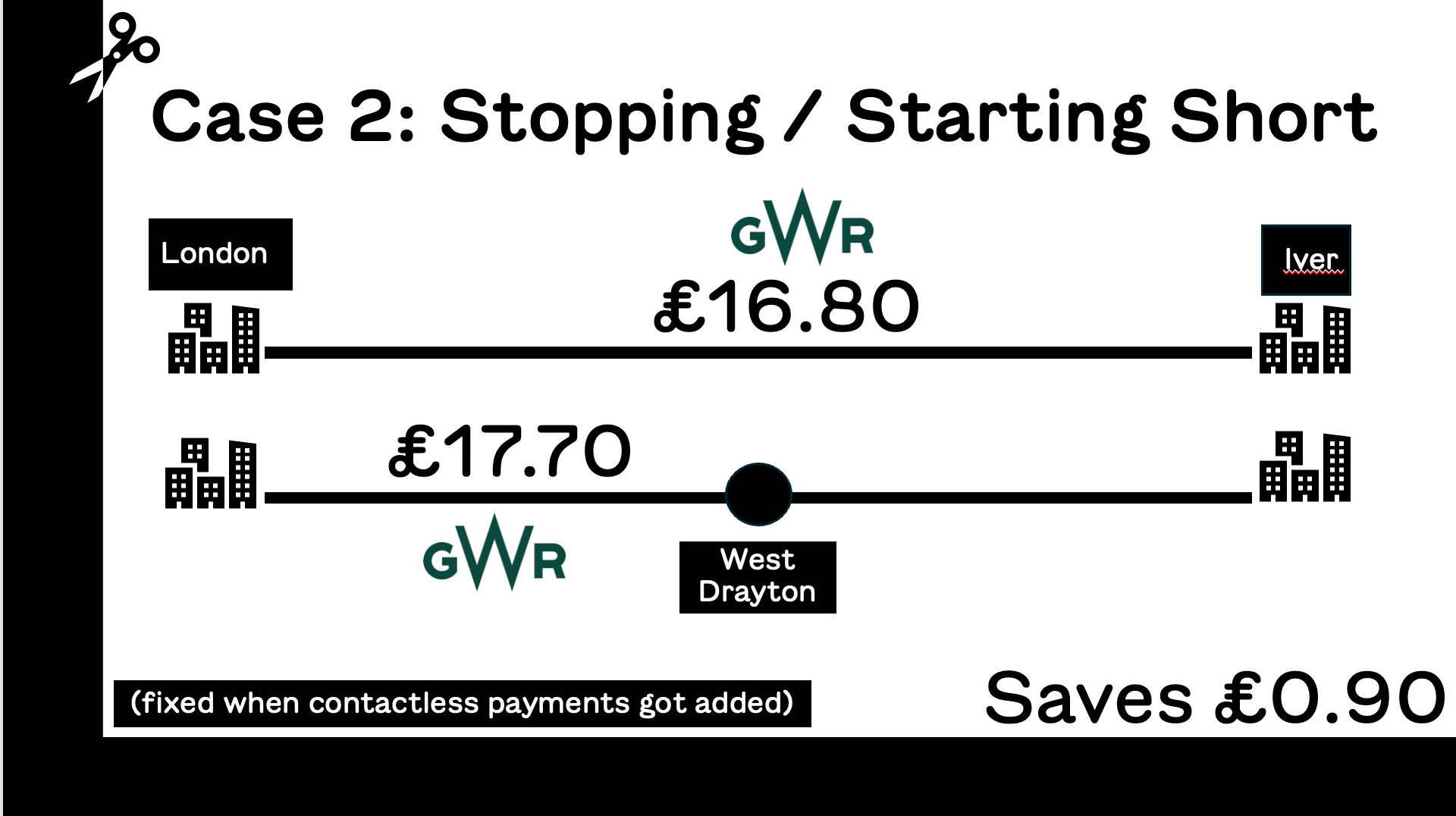Thomas The Privatised Tank Engine 30 years on - Fare Hacks

Rail fares in the UK are notoriously confusing, but the system’s oddities can also work in your favour. This post is a written version of my EMFcamp 2024 talk, where I explored the fare hacks that still exist thanks to rail privatisation’s quirks. This doesn't include the detail of the nature of the privatisation itself, which would have taken this to over 5000 words so I'll split that out and maybe sort you a nice diagram or something.
There are video links for my talk available here, if you'd just prefer to watch a video: https://www.emfcamp.org/schedule/2024/375-thomas-the-privatised-tank-engine-30-years-on
Some notes before we start:
- This was after various announcements to do with rail privatisation but before the most recent general election in 2024.
- I've made updates in line but labelled where it's relevant
- If you just wanted the slides the link is below:
The Fare Hacks
I explained several fare "hacks" and provided historical context as to why they work. This included 3 types of split ticketing. Below for reference:
Sailrail

You can take a train (and ferry) from any location in England, Wales or Scotland to Dublin for anything up to £60.10 for a walk up ticket. No "peak" or "offpeak". No draconian luggage limits. And... people don't tend to check you actually took the ferry. They do now prevent break of journey though. Book on tfw.wales or your favourite train booking website.
Why does this work? The ferry parts of the British Rail network were privatised a good few years before the big "bang" of rail privatisation in 1993, and thus inherited these fares as part of the privatisation agreement. These have risen in line with inflation over time but haven't had the huge leaps you've seen on the commuter routes.
Regional Railcards
So most people who travel by train occasionally know about the national railcards, eg Young Person's Railcard, The Disabled Persons Railcard, the Senior Railcard, and the more recent developments like the Two Together Railcard.
Less well known are regional railcards, which if you live local to an area or have family there, which still offer great discounts.
I'm not going to list them all here because some kind soul has put them on wikipedia for us all: https://en.wikipedia.org/wiki/Concessionary_fares_on_the_British_railway_network
Why does this work?
Regional railcards are often subsidised by some form of local governing authority responsible for the area (or a few grouped together). They're also pretty bad at publicising these for people outside the area. Before I left the UK I still had one of these, which gave me a 1/3 off me, 3 other adults and 4 children (60% discount on child fares) just on this one card:

In the case of the Network Railcard, this was effectively a marketing rebrand of this region of British Rail that occurred in the 1980s, and the railcard continues to be honoured, albeit some of the benefits have been softened over the years. If you are an annual season ticket holder in this area you are also entitled to get one of these for free, called a "gold card" https://www.nationalrail.co.uk/railcards/annual-gold-card/
PlusBus

You can often add on a day bus pass onto the start and end of your ticket (or just one side) - it's typically a fixed add on, and normally cheaper than two normal fares in the area you are using them. It's called PlusBus, head to https://www.plusbus.info to get more info on applicable locations.
Why does this work? When the privatisation process occurred and various companies bid to run franchises, a bunch of bus operators (privatised a decade ago) decided to have a go. When they did that, plusbus was added.
ScotRail no more peak fares
Scotland as of my talk in May 2024 were running a trial to to remove peak fares from their routes completely. This is actually live and real now! Credit to Russ Garrett because my last update was that they had considered this trial unsuccessful and were not doing it anymore...
Why did this happen? Scotrail has been back in public operation for a while now, notably by the Scottish government. This allowed for local policy to prevail into rail fares.
Avoid paying for peak fares (sometimes)

It turns out for journeys that start broadly in the SE London commuter area (the network railcard area), if you have a journey that needs you to go into London then back out to get to your destination, AND you're going somewhere further afield, ie not on the SE London commuter area... something magic happens.
Your journey only counts as "peak" if your train that leaves London is before 9am. That's it. No restriction on when you enter London.
For example, between Newbury and Leicester, if you go via London, you can leave Newbury any time you like. The restriction comes in at St Pancras:
| Outward Travel |
|---|
Not valid on trains timed to depart:
|
Be warned, Crosscountry have a bugbear with this one so if the route happens to be served by one of their trains, you sometimes get hassle - however going via London that is easy to avoid. In addition, TfL will throw a "no" at the tube when transferring, show your ticket and you will be let through, or if you don't want the hassle, pay the tube fare separately and take the hit.
Why does this work? This was true with British Rail fares and it continues to be honoured.
Split Ticketing
These are the most famous because you can get big savings on them. However, there are tonnes of variants of these, and the various options that now automate this don't have some of the more weird ones.
Definition:
Split Ticketing is where you buy multiple tickets instead of one to save money
OR
A compliant ticket or tickets for your journey that cost less than the expected mainstream fare
These broadly work because there are different competing companies on the same route BUT due to legacy rules around privatisation they are forced to accept each other's tickets on certain types of train tickets. And they have different incentives to price travel, for example, CrossCountry's routes have been very busy for years but aren't allowed to enforce a more European or airline style system where you have to allocate a seat with your fare and they are allowed to "sell out". So what they can do is price the walk up fares high in the hope that everyone defaults to the fares where you pick a train with a seat in advance. In addition, some destinations are more popular than others, and they have had some freedom to set some demand based pricing, which is more how airlines set pricing.
Example 1: Mainstream Split Ticketing

These were true as of May 2024, I have not updated the pricing.
These are the examples that the common train vendor sites can now do automatically. In this case, someone going long haul from Reading to Birmingham New Street is priced by Crosscountry as they run the route where you can go there without changing - this comes out at £70.20. However, GWR also run trains between Reading and Banbury and they've chosen to price their part at £16.30. Add on that Crosscountry then charge £24.10 for the Banbury to Birmingham leg and you've saved almost £30.
The most mainstream ticket booking sites with split ticketing normally know a few "common" stops where splits tend to improve pricing, check to see if your route includes these, then checks the fares splitting there. So it's often worth trying some of the more "advanced" sites if they don't give you a saving.
In the above case, all the tickets are the same ticket type and the same restrictions. When you mix and match, things start to get interesting.
Example 2: Off peak definition hacking

However, some train operating companies have different types of ticket available to get you to the same place, some more restrictive than others.
An extreme example above. If you wanted to go from London to Newcastle at say, around 2-3pm on a Tuesday, but didn't know exactly which day yet, there is no cheaper "off peak" ticket available you can walk up and buy on the day. Your two options are:
- Book a fixed seat and train, hoping some seats are left
- Buy a full fat Anytime Single (£195.10)
Here's an alternative - grab a train from Grand Central to Sunderland, then get the Tyne and Wear metro to Newcastle. This one saves over £100, but it does force you onto the trains that Grand Central run.
There are plenty of variants on this hack flying about, some flavours:
- It doesn't have to be a different route like the Newcastle example
- Some companies define off peak as starting at 9am, some 9:30am, some 10am
- There are different types of off peak - super off peak vs off peak
- Some off peak tickets care about which afternoon trains you take, some don't.
- You can actually split a long journey into peak and off peak if it's super long (ymmv - if you're willing to get off for 15min and take a coffee break and get on the next train, that's failsafe, sometimes it depends)
Why does this work? Each train operating company has their own incentives for encouraging or discouraging certain routes, but they're all allowed to define off peak and super off peak themselves (after starting from the British Rail baseline).
Now, another inherited trait for anytime and off peak tickets from British Rail also leads to this next hack.
Example 3: Stopping/Starting Short

Sometimes, fewer people want to go to a location that is a stop on the route to somewhere else. Used in combination with a ticket for the remaining distance, that's your classic split fare in example 1, but certain ticket types let you start your journey earlier or later. So you might be able to buy a ticket from a location further away from your start or end point and save money!
The example above is already patched thanks to this route now taking contactless fares in preparation of the Elizabeth line coming in.
Sometimes, this happens and actually reduces the fares for everyone - for example, the Grand Central routes allowing people to stop short forced the rest of the route to lower their prices. So the "hack" is gone, but the better pricing remains. Win for everyone, hopefully.
Bonus Extra Section
Most of these hacks do not need to be used separately - in fact you can often combine them!
But also... wouldn't it be better if train fares were just more affordable without needing degree-level knowledge in recent railway history?
When I concluded the talk, I emphasised the new role of mayors, especially in combined authorities - that they now have influence over the rail services that run in the area they are responsible for. In Scotland and Wales, the devolved governments have already had an effect - the Welsh government insisting on a factory in Wales for the train stock they purchased, for example.
So if you are in England and not London, I still believe your best shot to getting change in your area is to check you have a Mayor or live in a Combined Authority with devolved transport funding
https://geoportal.statistics.gov.uk/documents/a17870987716492c8f305825f05d104f/explore
https://www.centreforcities.org/publication/everything-need-know-metro-mayors
https://en.wikipedia.org/wiki/Levelling-up_and_Regeneration_Act_2023
https://en.wikipedia.org/wiki/Combined_authorities_and_combined_county_authorities
This has already had a great effect in Manchester and the Bee network, and I'm hearing developments coming from this from the industry side as well as a passenger, so it's been nice to see this little part of my talk already coming true only 18 months on.
Although I do apologise for those people who wanted me to rant about Virgin trains for 25 minutes and instead got a talk on the power of devolved government....




